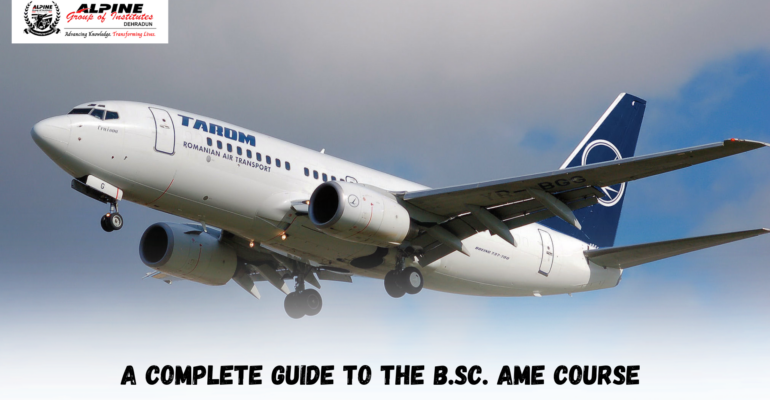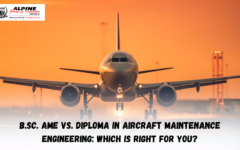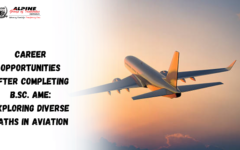A Complete Guide To The B.Sc. AME Course
2024-12-27 6:05A Complete Guide To The B.Sc. AME Course
The B.Sc. Aircraft Maintenance Engineering (AME) is a specialized undergraduate program that prepares students for careers in the aviation industry. The program focuses on the maintenance, repair, and overhauling of aircraft, ensuring that they meet safety and operational standards. It is a mix of theoretical learning and practical, hands-on training that equips students with the skills and knowledge required for working on various aircraft systems and components.
Aviation is one of the most rapidly growing industries globally, and as air travel continues to expand, the demand for skilled professionals in aircraft maintenance also rises. The B.Sc. in Aircraft Maintenance Engineering (AME) is one of the most sought-after courses for those passionate about aviation and engineering, offering a pathway to a stable and rewarding career in the aviation sector.
What is B.Sc. AME?
B.Sc. AME stands for Bachelor of Science in Aircraft Maintenance Engineering. This is a three-year undergraduate course that combines theoretical knowledge with practical training in aircraft maintenance and engineering. The course is designed to train students in the technicalities of aircraft systems. It focuses on preparing students to work as Aircraft Maintenance Engineers (AMEs), responsible for ensuring the safety and functionality of aircraft.
The aviation industry requires highly skilled professionals to maintain the complex systems of aircraft, making this course essential to ensuring safe air travel.Students enrolled in this course learn to work on the various systems of an aircraft such as propulsion systems, avionics, electrical systems, hydraulics, and structural components.
Is B.Sc. AME a License or Degree Course?
One of the key questions prospective students ask is whether B.Sc. AME is a license or a degree course.
- B.Sc. AME is a degree course. Upon successful completion of this program, students are awarded a Bachelor of Science degree in Aircraft Maintenance Engineering. This degree provides them with a strong foundation in aircraft systems, engineering principles, and maintenance procedures.
- However, in order to work as a certified Aircraft Maintenance Engineer (AME), graduates must obtain an AME license from the relevant regulatory authorities, such as the DGCA (Directorate General of Civil Aviation) in India or the EASA (European Union Aviation Safety Agency) in Europe.
Thus, the B.Sc. AME provides the necessary academic qualifications to pursue licensing exams, but the license itself is granted separately through regulatory authorities after meeting their requirements and passing the exams.
Eligibility Criteria for B.Sc. AME
Before applying for the B.Sc. AME course students must meet the eligibility requirements set by most institutions offering the program. These include:
1. Educational Qualifications:
- Candidates must have completed their 10+2 or equivalent education with Physics, Chemistry, and Mathematics as mandatory subjects.
- A minimum aggregate of 50-60% in the 12th board exams is required, though this can vary depending on the institution.
2. Age Limit:
- The minimum age for admission is generally 17 years at the time of admission.
- The maximum age limit varies but usually falls between 25 to 28 years, depending on the institution’s policies.
3. Medical Fitness:
- Students must meet certain medical standards related to vision, hearing, and overall health. This is particularly important as the profession requires individuals to have good physical and mental health to work in challenging environments.
Course Structure of B.Sc. AME
The B.Sc. AME program is divided into 3 academic years, with each year focusing on different aspects of aircraft maintenance, engineering principles, and hands-on training.
Breakdown of Course Duration:
- Year 1: Introduction to aircraft systems, basic engineering principles, aerodynamics, materials science, and aviation safety regulations.
- Year 2: Advanced study of aircraft engines, avionics, propulsion systems, hydraulic and pneumatic systems, and aircraft structures. Students also get more exposure to practical skills.
- Year 3: Final year focuses on specialized aircraft systems, maintenance management, and troubleshooting. The third year also includes internships and on-the-job training with aviation companies or maintenance organizations.
Here’s a detailed breakdown of the subjects typically covered throughout the three years:
Year 1: Foundation and Basics
- Introduction to Aircraft Systems: Basic understanding of the various systems in an aircraft, including electrical, hydraulic, and pneumatic systems.
- Aerodynamics and Aircraft Structures: Study of how air moves around aircraft and the structures that support flight.
- Mathematics and Physics for Engineers: Fundamental concepts necessary for engineering applications in aircraft systems.
- Basic Aircraft Maintenance Practices: Introduction to the tools, equipment, and safety protocols used in the maintenance of aircraft.
- Aircraft Safety Regulations: Understanding the laws and regulations that govern the aviation industry.
Year 2: Advanced Systems and Specialization
- Aircraft Propulsion Systems: In-depth study of the engines used in aircraft, including jet engines, turboprop engines, and their maintenance procedures.
- Avionics Systems: The study of aircraft electronics, including communication, navigation, and flight control systems.
- Hydraulic and Pneumatic Systems: Detailed study of aircraft’s fluid systems, used for flight control, braking, and other essential functions.
- Aircraft Maintenance Management: Managing the logistics of maintaining an aircraft, including maintenance scheduling, inventory control, and documentation.
Year 3: Practical Training and Licensing Preparation
- Advanced Aircraft Systems: Detailed study of modern aircraft systems and components, focusing on the latest technological advancements.
- Troubleshooting and Diagnostics: Learning how to detect and solve technical problems in aircraft systems and components.
- Hands-on Training and Internships: Extensive on-the-job training with industry professionals at maintenance organizations, airports, or aviation companies.
- Preparation for AME Licensing Exams: The final year also includes preparation for obtaining an AME license, including covering the theoretical and practical aspects needed to pass licensing exams.
Why is B.Sc. AME Essential?
The B.Sc. AME course is essential for several reasons:
- Safety of Air Travel: Aircraft maintenance engineers are crucial for the safety of the aviation industry. Regular inspection, maintenance, and repairs ensure that aircraft are safe to fly, preventing accidents and mishaps.
- Compliance with Aviation Regulations: The aviation industry is highly regulated. AMEs ensure that aircraft are compliant with the maintenance and safety standards set by aviation authorities like the FAA, DGCA, and EASA.
- Technological Advancements: The aviation industry constantly evolves with new technologies. B.Sc. AME students are equipped to handle the latest advancements in aircraft engineering and maintenance, including electric and hybrid propulsion systems, AI, and automation.
- High Demand for Skilled Technicians: With the global rise in air travel, the demand for skilled AMEs is growing. This course helps meet the increasing need for qualified professionals who can maintain both commercial and military aircraft.
Key Benefits of Pursuing a B.Sc. AME Degree
Here are some of the top benefits of pursuing the B.Sc. AME course:
1. Global Career Opportunities
The demand for qualified Aircraft Maintenance Engineers is high across the globe. Graduates of the B.Sc. AME course can find job opportunities in airlines, military aviation, aircraft manufacturers, and maintenance organizations worldwide. This opens doors to international career options and mobility.
2. High Earning Potential
A career in aircraft maintenance offers attractive salary packages. Depending on the role and experience, Aircraft Maintenance Engineers can earn high salaries, especially in international aviation companies. AMEs with licenses and experience often earn better than their counterparts in other engineering fields.
3. Hands-On Learning Experience
B.Sc. AME students get ample opportunities for practical training through internships, where they get to work on real-world aircraft systems. This hands-on experience prepares them for the actual demands of the job and improves employability.
4. Job Stability and Growth
The aviation industry is one of the most recession-resistant industries, and skilled professionals like AMEs are always in demand. As air travel continues to grow, the need for maintenance engineers increases, providing job security and long-term career growth.
5. Contribution to Aviation Safety
AMEs play a key role in ensuring that aircraft remain in optimal condition and meet all safety standards. This sense of responsibility and contribution to aviation safety is a source of pride and job satisfaction for professionals in the field.
6. Career Progression
Graduates can progress in their careers by acquiring additional licenses and certifications, gaining more specialized knowledge in certain aircraft systems, and taking on supervisory or managerial roles in aircraft maintenance.
Conclusion
The B.Sc. AME course is a well-rounded program that provides students with the necessary skills and knowledge to become skilled Aircraft Maintenance Engineers. The course offers hands-on training and theoretical knowledge about aircraft systems, maintenance practices, and aviation regulations. While it is a degree course, it also lays the foundation for obtaining the necessary AME licenses, which are required to work in the field as certified professionals. The demand for skilled AMEs is high, making this course an attractive option for those interested in pursuing a career in aviation.






